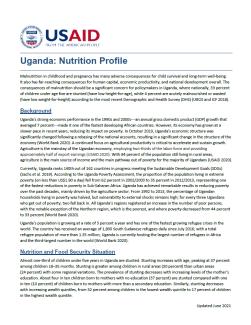Uganda’s strong economic performance in the 1990s and 2000s—an annual gross domestic product (GDP) growth that averaged 7 percent—made it one of the fastest developing African countries. However, its economy has grown at a slower pace in recent years, reducing its impact on poverty. In October 2019, Uganda’s economic structure was significantly changed following a rebasing of the national accounts, resulting in a significant change in the structure of the economy (World Bank 2020). A continued focus on agricultural productivity is critical to accelerate and sustain growth. Agriculture is the mainstay of the Ugandan economy, employing two-thirds of the labor force and providing approximately half of export earnings (USAID 2020). With 84 percent of the population still living in rural areas, agriculture is the main source of income and the main pathway out of poverty for the majority of Ugandans (USAID 2020).
Currently, Uganda ranks 140th out of 162 countries in progress meeting the Sustainable Development Goals (SDGs) (Sachs et al. 2019). According to the Uganda Poverty Assessment, the proportion of the population living in extreme poverty (on less than US$1.90 a day) fell from 62 percent in 2002/2003 to 35 percent in 2012/2013, representing one of the fastest reductions in poverty in Sub-Saharan Africa. Uganda has achieved remarkable results in reducing poverty over the past decades, mainly driven by the agriculture sector. From 1992 to 2013, the percentage of Ugandan households living in poverty was halved, but vulnerability to external shocks remains high; for every three Ugandans who get out of poverty, two fall back in. All Uganda’s regions registered an increase in the number of poor persons, with the notable exception of the Northern region, which is the poorest, and where poverty decreased from 44 percent to 33 percent (World Bank 2020).
Uganda’s population is growing at a rate of 3 percent a year and has one of the fastest growing refugee crises in the world. The country has received an average of 1,800 South Sudanese refugees daily since July 2016; with a total refugee population of more than 1.35 million, Uganda is currently hosting the largest number of refugees in Africa and the third-largest number in the world (World Bank 2020).

